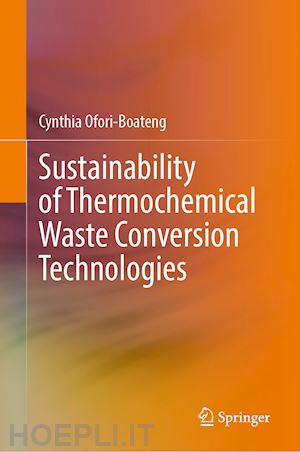
Questo prodotto usufruisce delle SPEDIZIONI GRATIS
selezionando l'opzione Corriere Veloce in fase di ordine.
Pagabile anche con Carta della cultura giovani e del merito, 18App Bonus Cultura e Carta del Docente
This book elaborates on the sustainability of biofuels and biochemicals production via thermochemical conversion pathways. Sustainability encompasses the social, economic, environmental, political, and thermodynamic efficiencies of a production technology. Assessing the sustainability of wastes conversion pathways would help pinpoint inefficiencies hence improving the process economically, environmentally, and thermodynamically. This book discusses the major sustainable potential feedstocks/waste for thermochemical conversion into bioproducts such as biodiesel and bioelectricity. Though there exist many pathways for thermochemical waste conversion (such as combustion, gasification, and pyrolysis) which operate on laboratory, pilot and commercial scales, their sustainability indices are scarce as there exist few sustainability assessment tools to help pinpoint inefficiencies. This book assesses the sustainability of various types of thermochemical conversion pathways using technoeconomic analysis as well as exergetic life cycle assessment tools. Common sustainability issues and the way forward for sustainable thermochemical wastes conversion into bioproducts are detailed in this book. For overall sustainability, thermochemical waste conversion process development alternatives are also discussed in this book. Given its scope, this is a valuable resource for renewable energy policy makers, bioprocess researchers in academia and related industries, students studying in the fields of Green Chemistry, Chemical and Mechanical Engineering as well as the general publics who have great interest in biofuels for sustainable development. Almost all books on thermochemical biomass conversion address only the process and new technologies, but few tend to address the technical and thermodynamic issues pertaining to sustainability due to the use of fossil fuel in the manufacturing process. This book bridges this knowledge gap, and subsequently outlines specific exergetic improvement options for biofuel and biochemicals production which is scarce in literature. This book assesses the sustainability of bioprocess technologies in a more concise manner for students to understand and apply the knowledge in their future engineering careers.
Types of Biomass and Wastes for Thermochemical Conversion into Bioproducts.- Global Production and Consumption Profile of Bioproducts.- Current Thermochemical Biomass Wastes Conversion Pathways.- Current Development, Challenges and Potential Breakthroughs of Thermochemical Conversion Technologies.- Exergetic Life Cycle Analysis of Thermochemical Biomass Wastes Conversion Technologies.- Technoeconomic Analysis of Thermochemical Conversion processes into Bioproducts.- General Improvement options for Sustainable Thermochemical Biomass Conversion Technologies.
Dr. Cynthia Ofori-Boateng is currently an Assistant Professor of Chemical Engineering at the University of Pittsburgh, Johnstown with a BSc., MSc. and Ph.D. in Chemical Engineering. Prior to her current role, she was a Senior Scientist supporting Upstream Process Development Projects at the Center for Breakthrough Medicines at the Discovery Labs and Eurofins Lancaster Laboratories, Inc. with Janssen Pharmaceutical Company of Johnson and Johnson in Pennsylvania, USA. Cynthia has about 15 years of both academic and industrial experience through which she has been able to achieve excellence through publications, research, scholarships, and teaching. Cynthia was part of a team that designed and installed a 10 m3 biogas plant as well as built a fuel analytical testing laboratory for Koforidua Technical University in Ghana. Whilst at the United States Department of Agriculture (USDA/ARS) in Wyndmoor, Pennsylvania, Cynthia helped her team to develop a new technology (Tail Gas Reactive Pyrolysis/TGRP) which was more sustainable than the existing pyrolysis plant. Cynthia led the team to assess and improve the sustainability of the TGRP plant which could produce biofuel to generate electricity at about 65% cheaper selling price compared to conventional electricity production from crude oil. With the same innovative engineering and entrepreneurial ideas and skills, Cynthia has supervised many groups of students to design pilot and commercial biofuel production plants utilizing waste materials for potential funding, set up and operation. Cynthia’s Bioproducts Sustainability Research Group also performs laboratory experiments on how to improve biofuel production plants by optimizing and modeling processes in Aspen Plus software and performing sustainability assessment via the exergetic life cycle (ExLCA) and exergo-economic analyses tools. Cynthia’s main career focus has been on the Sustainability of Biorefineries and Waste Management Technologies. Cynthia has attended numerous international conferences to present her research findings, and has published numerous research articles, a couple of books and book chapters. Cynthia is a member of the Ghana Institution of Engineers (GhIE), American Institute of Chemical Engineers (AIChE) and American Chemical Society (ACS).











Il sito utilizza cookie ed altri strumenti di tracciamento che raccolgono informazioni dal dispositivo dell’utente. Oltre ai cookie tecnici ed analitici aggregati, strettamente necessari per il funzionamento di questo sito web, previo consenso dell’utente possono essere installati cookie di profilazione e marketing e cookie dei social media. Cliccando su “Accetto tutti i cookie” saranno attivate tutte le categorie di cookie. Per accettare solo deterninate categorie di cookie, cliccare invece su “Impostazioni cookie”. Chiudendo il banner o continuando a navigare saranno installati solo cookie tecnici. Per maggiori dettagli, consultare la Cookie Policy.